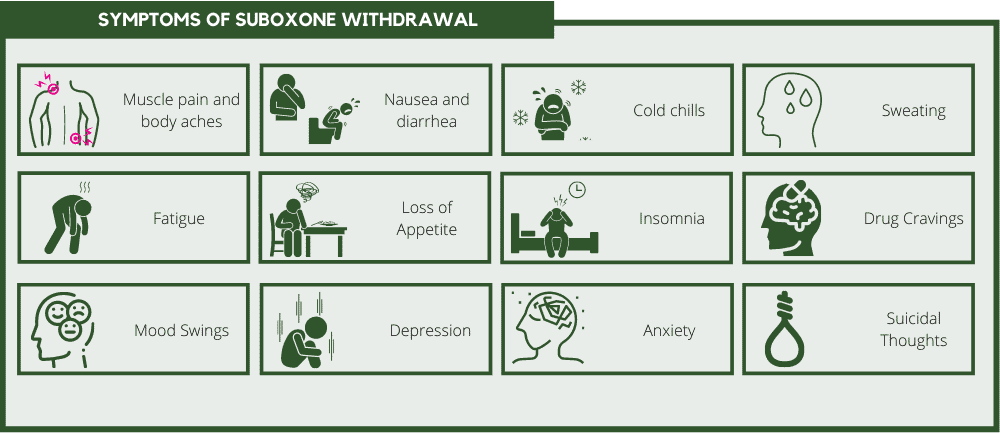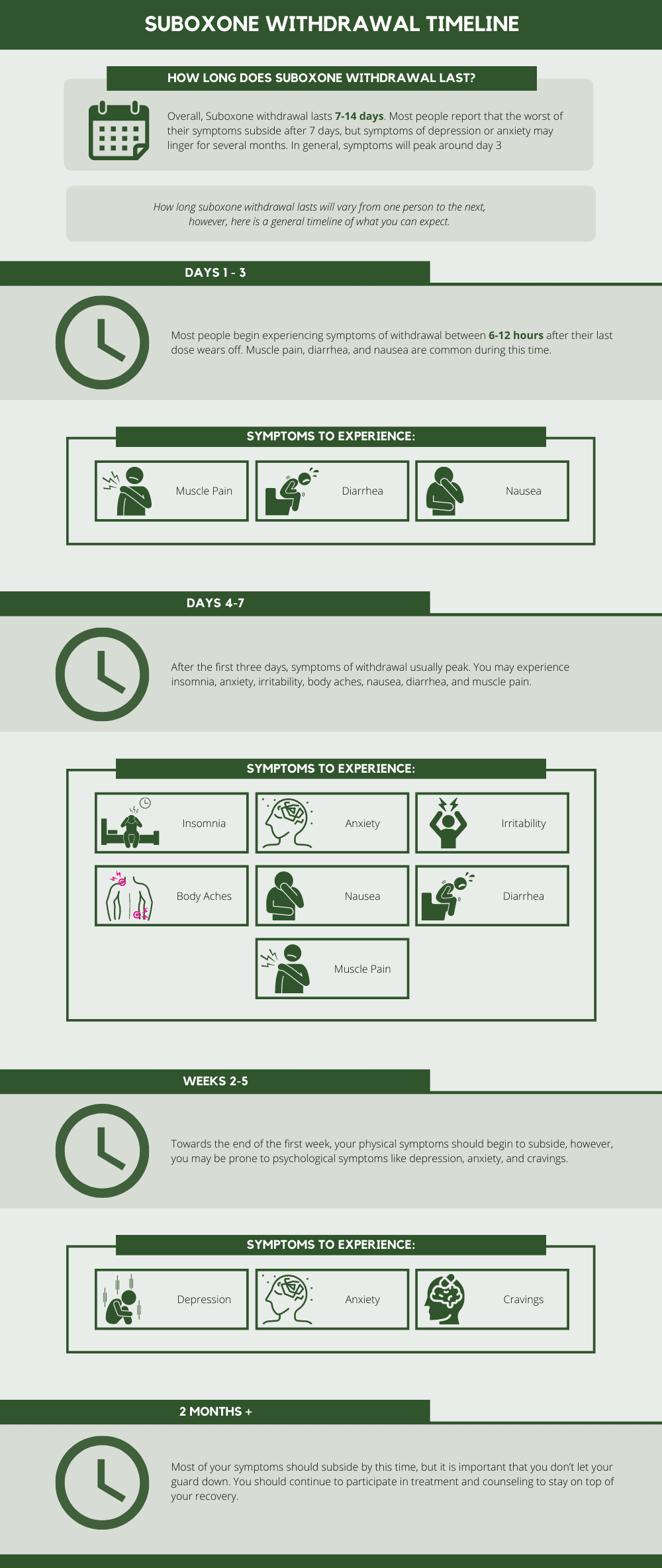Suboxone (buprenorphine/naloxone) is a medication that is considered the gold standard in treating opioid addiction. You may have been prescribed Suboxone if you were detoxing from drugs like heroin, fentanyl, oxycodone, or morphine. While this medication is highly effective at treating opioid withdrawal and reducing drug cravings, it can be physically addictive.[1]
Buprenorphine is a partial opioid receptor agonist. Even though it is safer and less addictive than methadone and other opioids, it still has opioid properties.[2] As a result, people who take medications containing buprenorphine, like Suboxone, may experience withdrawal symptoms when they stop. Whether you have been taking Suboxone as prescribed or have been abusing it, you may be wondering how long Suboxone withdrawal lasts and what you can expect while detoxing.
You will find that your experience with withdrawal depends largely on how long you have been using Suboxone and at what dose. Fortunately, opioid rehab programs offer precise tapering schedules that can help you endure a safer and more comfortable withdrawal.

Symptoms of Withdrawal
Suboxone withdrawal is similar to opioid withdrawal, however, the timeline may last a little longer because buprenorphine is a long-acting opioid. Symptoms of withdrawal include:
- Muscle pain and body aches
- Nausea and diarrhea
- Cold chills
- Sweating
- Fatigue
- Loss of appetite
- Insomnia
- Drug cravings
- Mood swings
- Depression
- Anxiety
- Suicidal thoughts

How Long Does Suboxone Withdrawal Last?
Everyone experiences Suboxone withdrawal differently depending on individual factors. This is because there are many variables that influence how long Suboxone withdrawal lasts. Some of these include:
- How long you have been taking Suboxone or buprenorphine
- What dose of Suboxone you have been taking
- Your overall health including liver and kidney function
- Your age, weight, BMI, and gender
Overall, Suboxone withdrawal lasts 7-14 days. Most people report that the worst of their symptoms subside after 7 days, but symptoms of depression or anxiety may linger for several months. In general, symptoms will peak around day 3.[3]

Get The Care You Need and Deserve
Woburn Wellness Addiction Treatment is a leader in the addiction treatment field, with proven success in facilitating long-term recovery. Our team of top clinical & medical experts specializes in treating addiction coupled with mental illness, ensuring that each person receives individualized care. Call us – we’re available 24/day, 7 days/week.
Suboxone Withdrawal Timeline
How long suboxone withdrawal lasts will vary from one person to the next, however, here is a general timeline of what you can expect.
Days 1-3
Most people begin experiencing symptoms of withdrawal between 6-12 hours after their last dose wears off. Muscle pain, diarrhea, and nausea are common during this time.
Days 4-7
After the first three days, symptoms of withdrawal usually peak. You may experience insomnia, anxiety, irritability, body aches, nausea, diarrhea, and muscle pain.[3]
Weeks 2-5
Towards the end of the first week, your physical symptoms should begin to subside, however, you may be prone to psychological symptoms like depression, anxiety, and cravings.
2 Months +
Most of your symptoms should subside by this time, but it is important that you don’t let your guard down. You should continue to participate in treatment and counseling to stay on top of your recovery.
Coping During Suboxone Detox
Suboxone withdrawal is not as intense as opioid withdrawal, and if you have been participating in a medication-assisted treatment (MAT) program, you should have the tools and resources you need to cope with most of your symptoms. There are many ways you can cope with withdrawal and reduce your symptoms, some of which can be achieved right in your own home. Still, it is a good idea to consult with your physician before stopping Suboxone. Your doctor will be able to help you taper off Suboxone slowly. Although tapering increases the withdrawal timeline, it can help you avoid many of the unruly withdrawal symptoms. While stopping Suboxone, some coping mechanisms that can help you through withdrawal are:
- Sober support – Humans are social by nature, but people in recovery need to have a sober support network of people they can turn to during difficult times. While detoxing, you should stay connected with your sober supports and make an extra effort to ask for help.
- Hydration – Without water, you can’t survive. But even the slightest level of dehydration can exacerbate your symptoms. Stay hydrated and drink plenty of water. You will have more energy and be able to flush your system out faster and speed up the Suboxone withdrawal timeline.
- Nutritious diet – Eating a balanced and healthy diet can help improve your mood and reduce your discomfort. Even if you don’t feel hungry, a small snack of fruits and vegetables can go a long way.
- Stay busy – The more time your mind has to wander, the more you will focus on your symptoms of discomfort. Try staying busy by reading a book, going for a walk, playing a game, or doing an activity you enjoy.
In addition to a gradual Suboxone taper, you may be able to take some over-the-counter medications to help treat some of your symptoms. However, be sure to consult with your doctor before taking any medication. Some common home remedies used for Suboxone withdrawal include:
- Ibuprofen or acetaminophen for body aches and muscle pain
- Tums or ginger ale for stomach aches
- Pepto-Bismol for nausea
- Loperamide or other antidiarrheals
- Vitamins and supplements
Find The Help You Deserve
Although Suboxone is an FDA-approved treatment medication, it does carry a risk of abuse. And, if you’ve been abusing Suboxone, you may experience withdrawal symptoms when you quit. Even if you have been taking Suboxone as prescribed by your doctor, your body may have become physically dependent, so you may need assistance with detox. Regardless of your circumstances, our team at Woburn Wellness Addiction Treatment Center is not here to judge you. Instead, we’re here to help connect you with the resources you need to get clean and stay clean. Don’t wait any longer. Pick up the phone and call one of our dedicated treatment professionals today.
References:


